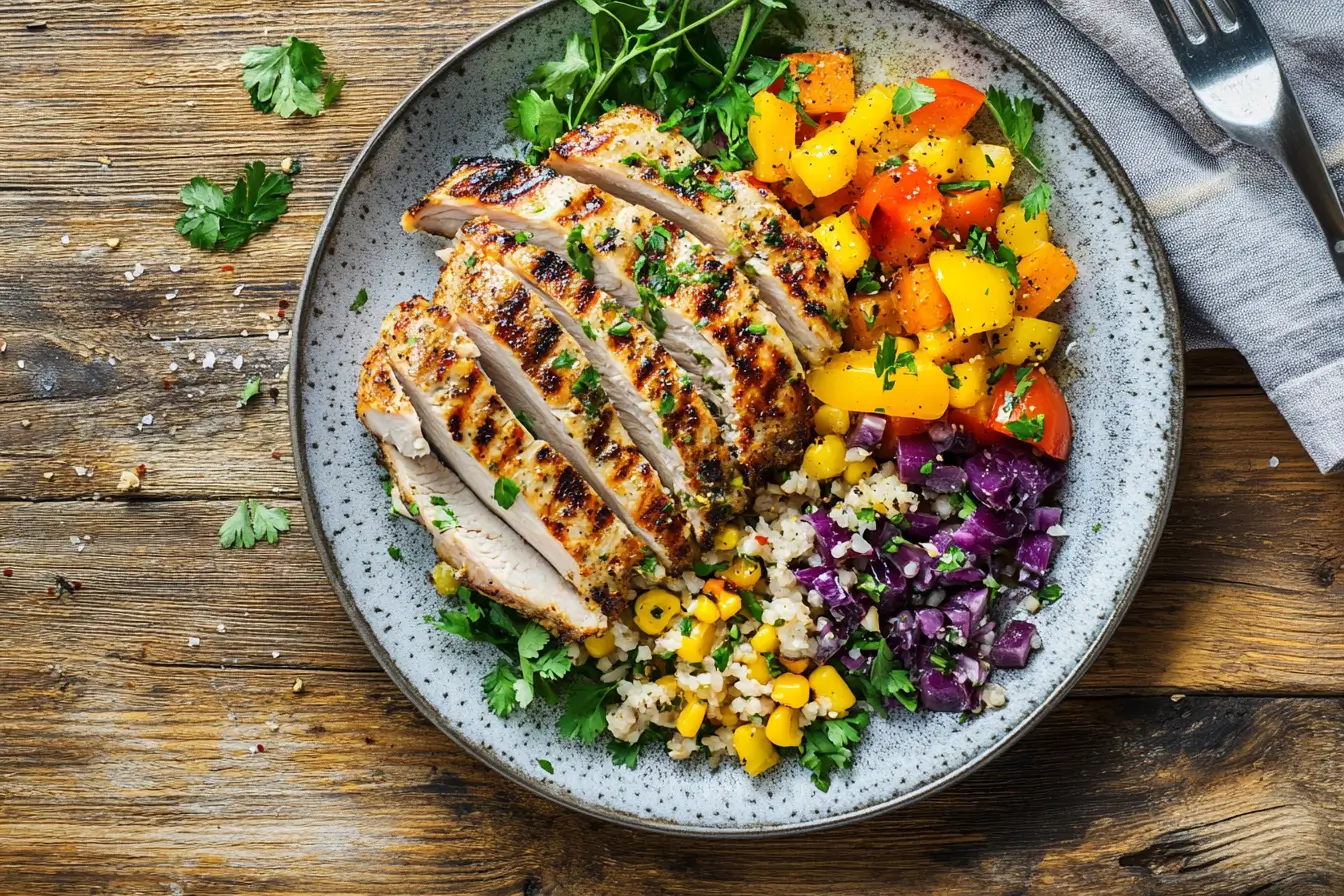When it comes to healthy eating, turkey ribs might not be the first option that comes to mind, but they’re gaining popularity for good reason. They offer a unique combination of flavor, nutritional benefits, and versatility in the kitchen. In this article, we’ll dive deep into the question “Are turkey ribs healthy?” by examining their nutritional profile, potential health benefits, and how they stack up against other meat options. Whether you’re curious about incorporating turkey ribs into your diet or just want to explore new protein sources, we’ve got you covered.
Introduction to Turkey Ribs
What Are Turkey Ribs?
Turkey ribs, despite their name, are not actually ribs from a turkey. Instead, they come from the shoulder area and are shaped to resemble ribs. These cuts of meat are tender, flavorful, and typically include a portion of the turkey’s shoulder blade. They’re a creative alternative to traditional ribs for those looking to mix things up.
Why Are Turkey Ribs Gaining Popularity?
The rise of turkey ribs can be attributed to their versatility and health benefits. As more people aim to reduce their red meat consumption, turkey ribs provide a lighter, leaner option without sacrificing flavor. Additionally, they cater to various dietary needs, making them a favorite among those following low-fat, low-carb, or high-protein diets. explore our tips on low-carb and healthy recipes.
Nutritional Profile of Turkey Ribs
Calories and Macronutrient Breakdown
When asking, “Are turkey ribs healthy?”, one of the first considerations is their calorie and macronutrient content. Turkey ribs are relatively low in calories compared to pork or beef ribs. A 3-ounce serving typically contains about 120–150 calories, depending on preparation methods. This makes them an excellent choice for individuals aiming to manage their caloric intake.
In terms of macronutrients, turkey ribs shine as a protein-packed option. Each serving delivers approximately 20–25 grams of protein, which supports muscle growth and repair. Their fat content is modest, ranging between 4–8 grams per serving, depending on whether the skin is included. This balance of macronutrients makes them a satisfying and leaner choice for meat lovers.
if you eat chicken explore this comprehensive nutrition guide.
Vitamins and Minerals in Turkey Ribs
Turkey ribs are also a rich source of essential vitamins and minerals. They boast significant amounts of B vitamins, including B6 and niacin, which play a role in energy production and brain health. Additionally, they provide minerals like zinc, which supports immune function, and phosphorus, vital for bone health.
Compared to traditional ribs, turkey ribs are lower in saturated fat and cholesterol, which are often linked to heart disease. By incorporating turkey ribs into your diet, you can enjoy a flavorful meal without overloading on unhealthy fats.
Comparison to Pork or Beef Ribs
When stacking turkey ribs against pork or beef ribs, the differences are clear. Turkey ribs have fewer calories and significantly less fat, especially saturated fat. They also contain less cholesterol, making them a heart-healthy alternative. On the other hand, pork and beef ribs are often richer in iron. However, for those prioritizing a leaner protein source, turkey ribs are hard to beat.
Health Benefits of Turkey Ribs
Lower Fat Content Compared to Other Meats
One of the most significant advantages of turkey ribs is their lower fat content. Unlike beef or pork ribs, turkey ribs contain predominantly unsaturated fats, which are healthier for your heart. They help reduce bad cholesterol levels while boosting good cholesterol, making them an excellent choice for those with cardiovascular concerns.
If you’ve been wondering, “Are turkey ribs healthy?”, their low-fat profile is a compelling reason to give them a try, especially if you’re aiming to reduce red meat consumption.
Rich Source of Protein for Muscle Growth
Protein is a vital nutrient, and turkey ribs deliver it in abundance. Whether you’re an athlete, a fitness enthusiast, or someone trying to maintain muscle mass, turkey ribs are a fantastic addition to your meals. The protein in turkey ribs is of high biological value, meaning your body absorbs and uses it efficiently.
Pairing turkey ribs with vegetables or whole grains can create a balanced meal that supports recovery, energy, and overall health.
Potential Anti-Inflammatory Benefits from Nutrients
Certain nutrients in turkey ribs, like B vitamins and zinc, may offer anti-inflammatory properties. Chronic inflammation is a risk factor for numerous diseases, including arthritis and heart disease. By incorporating turkey ribs into your diet, you can enjoy a delicious meal that might also contribute to reducing inflammation over time.
Potential Drawbacks of Turkey Ribs
High Sodium Levels in Processed Options
When asking “Are turkey ribs healthy?”, it’s crucial to consider how they’re prepared. Processed or prepackaged turkey ribs often come seasoned or marinated, which can significantly increase their sodium content. Consuming too much sodium can lead to issues like high blood pressure and water retention.
To avoid this, opt for fresh or minimally processed turkey ribs, and use your own seasonings to control sodium levels.
Presence of Additives in Prepackaged Turkey Ribs
Another concern with prepackaged turkey ribs is the presence of preservatives and artificial flavors. While these additives help extend shelf life and enhance taste, they may not be ideal for those looking for a cleaner, healthier diet.
When shopping for turkey ribs, check the ingredient list and look for options labeled “no added preservatives” or “all-natural.”
Concerns for Those with Allergies to Poultry
Although rare, some individuals may have allergies or sensitivities to poultry. Symptoms can range from mild reactions like itching to more severe ones such as difficulty breathing. If you’re unsure, consult a healthcare professional before incorporating turkey ribs into your meals.
For more delicious recipes and tips on healthy cooking, check out our recipe section.
Cooking and Preparation Techniques
Healthy Cooking Methods for Turkey Ribs
Preparing turkey ribs in a healthy way can make a significant difference. Opt for cooking methods like grilling, baking, or steaming, which preserve nutrients while keeping fat content low. Avoid deep-frying, as it adds unnecessary calories and saturated fats.
A great tip is to use a marinade with olive oil, garlic, and fresh herbs to enhance flavor while keeping it heart-healthy. Discover more about flavorful, healthy cooking techniques in our recipe section.
Popular Seasonings and Marinades to Enhance Flavor
Turkey ribs are a blank canvas when it comes to flavor. Popular seasonings include smoked paprika, cumin, and lemon zest. For marinades, try combinations of citrus juices, honey, and mustard for a tangy kick.
Experimenting with low-sodium soy sauce or apple cider vinegar can also add depth to the flavor without compromising on healthiness.
Tips for Reducing Sodium and Preservative Intake
If you’re concerned about sodium or preservatives, preparing turkey ribs from scratch is the way to go. Look for fresh turkey ribs at your local butcher or grocery store. Season them with natural ingredients like herbs, spices, and fresh garlic instead of relying on store-bought sauces or mixes.
By controlling the ingredients, you can enjoy a flavorful dish that’s also nutritious.
Turkey Ribs in a Balanced Diet
How to Incorporate Turkey Ribs into Meal Plans
Are you looking to incorporate turkey ribs into your weekly meals? They’re not only versatile but also easy to pair with a variety of side dishes. To create a balanced meal, serve turkey ribs with roasted vegetables like sweet potatoes, zucchini, or asparagus. Adding whole grains, such as quinoa or brown rice, can further round out the nutritional value.
By thoughtfully combining turkey ribs with nutrient-dense foods, you can enjoy a meal that’s both delicious and health-conscious. Whether you’re meal prepping or hosting a dinner party, turkey ribs can fit seamlessly into your menu.
Balancing Turkey Ribs with Other Protein Sources
While turkey ribs are a great source of lean protein, variety is key to a healthy diet. Alternating turkey ribs with other proteins like fish, chicken, or plant-based options can ensure you’re getting a broad spectrum of nutrients.
So, are turkey ribs healthy? Absolutely, but balance is vital. Pair them with high-fiber foods and healthy fats to maximize their nutritional potential. By rotating your protein sources, you’ll keep your meals interesting and nutritionally diverse.
FAQs About Turkey Ribs
Are Turkey Ribs a Good Option for Weight Loss?
Yes, turkey ribs can be an excellent option for weight loss due to their high protein content and relatively low calorie count. Protein helps keep you full for longer, reducing the temptation to snack on unhealthy foods. However, to maintain their weight-loss-friendly profile, avoid adding calorie-dense sauces or frying them.
How Do Turkey Ribs Compare to Chicken or Fish?
Turkey ribs hold their own when compared to chicken or fish. While chicken is slightly leaner and fish provides omega-3 fatty acids, turkey ribs offer a unique flavor and a satisfying texture. Plus, they contain a similar amount of protein, making them a great alternative when you’re looking for variety.
Are Turkey Ribs Suitable for a Low-Carb or Keto Diet?
Absolutely! Turkey ribs are naturally low in carbs, making them a fantastic choice for low-carb or keto diets. Pair them with keto-friendly sides like cauliflower rice or a fresh spinach salad for a wholesome, satisfying meal.
Final Thoughts on the Healthiness of Turkey Ribs
Summarizing the Nutritional and Health Insights
So, are turkey ribs healthy? The answer depends on how they’re prepared and incorporated into your diet. Turkey ribs offer a lean, protein-rich alternative to traditional ribs, with fewer calories and less saturated fat. They’re also packed with important nutrients like B vitamins, zinc, and phosphorus, making them a great choice for anyone seeking a nutritious, flavorful meal.
However, it’s important to consider factors like sodium content and potential additives in processed options. By choosing fresh turkey ribs and preparing them with healthy cooking methods, you can fully enjoy their benefits while minimizing any drawbacks.
Key Recommendations for Including Turkey Ribs in Your Diet
If you’re new to turkey ribs, start by integrating them into your weekly meals as a substitute for red meat. Grill, bake, or steam them to retain their natural flavors without adding unnecessary fats or calories. Pair them with wholesome sides like leafy greens or whole grains to create a balanced plate.
By following these tips, you can confidently add turkey ribs to your diet and enjoy their nutritional perks. Whether you’re aiming for weight loss, muscle gain, or simply exploring new flavors, turkey ribs can be a versatile and healthy choice.


1 thought on “Are Turkey Ribs Healthy? Everything You Need to Know”